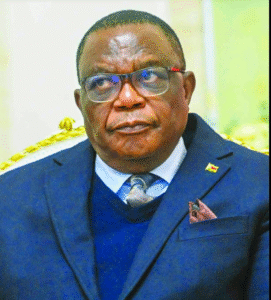PASSENGER 34 SCANDAL: KASUKUWERE’S STAGED RETURN ROCKS ZIMBABWEAN POLITICS

Zimbabwe’s political arena has been thrown into disarray following the bizarre and scandalous saga of Saviour Kasukuwere—code-named “Passenger 34.” Once a key player in ZANU PF, Kasukuwere’s faked return to Zimbabwe has not only unsettled the ruling party but also sparked widespread speculation, exposed deep political cracks, and shifted the tone of the upcoming elections.
The staged nature of Kasukuwere’s return caught many by surprise, especially within ZANU PF. The dramatic deception has left political observers questioning the party’s internal coherence and direction. While some within ZANU PF initially viewed Kasukuwere’s supposed comeback as a potential realignment or power play, the revelation that it was a hoax has instead laid bare a party riddled with mistrust and infighting.
For ZANU PF, this scandal couldn’t have come at a worse time. The 2023 elections are drawing near, and the party is already under pressure over its handling of the economy, governance failures, and growing public discontent. The Kasukuwere debacle now risks further damaging its credibility and unity, revealing just how fragile the internal dynamics have become.
Meanwhile, the Citizens’ Coalition for Change (CCC) has found itself presented with a political gift. The Passenger 34 scandal has reinforced the opposition’s core narrative—ZANU PF thrives on manipulation, secrecy, and deception. CCC can now amplify its calls for accountability, ethical leadership, and transparent governance. If CCC successfully communicates this contrast to the electorate, it may galvanize support, particularly among urban voters and the growing number of undecided Zimbabweans.
The scandal also raises broader questions about the integrity of the ruling party. How did such a farce unfold? Who was behind it? And more importantly, what does it say about the level of dysfunction within the highest echelons of ZANU PF leadership? Voters may begin to question whether a party that falls for—or orchestrates—such political theatre can be trusted to run a country already facing crisis after crisis.
However, the ultimate impact of this scandal will depend on how both major parties handle the aftermath.
ZANU PF must quickly attempt damage control. It will need to convince voters that the Passenger 34 incident is an isolated misstep, not evidence of a party unraveling. The leadership may also seek to refocus attention on its claimed achievements, while discrediting Kasukuwere as a rogue actor with no relevance to the party’s direction.
On the other hand, CCC must keep its messaging clear and focused. This is a moment to drive home the contrast between a corrupt, chaotic past and a potential future based on reform, lawfulness, and competence. By highlighting ZANU PF’s failure to self-regulate and its continued reliance on dirty political tricks, the opposition can present itself as the credible, clean alternative Zimbabwe desperately needs.
The so-called “Passenger 34” scandal is more than just political gossip—it reflects the ongoing erosion of trust in Zimbabwe’s ruling party and presents a critical moment for opposition forces to shift the narrative. While Kasukuwere may not be on the ballot, his ghost haunts this election cycle, a symbol of the gamesmanship, confusion, and desperation that continue to define ZANU PF’s grip on power.
As Zimbabwe inches closer to the polls, the fallout from this drama will undoubtedly shape public sentiment. Whether it proves to be a turning point or just another footnote in Zimbabwe’s troubled political history remains to be seen—but one thing is certain: the game has changed.



